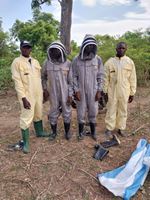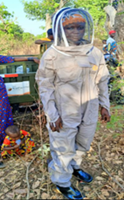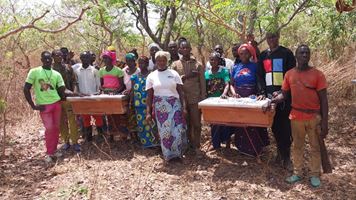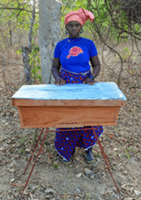Like most plant crops, shea nuts are seasonal and can only be harvested between June and August each year. To create a diverse income, Bunge supports a variety of projects to sustain the livelihoods outside the shea season. In Ivory Coast, a pilot project has been launched to train local communities in beekeeping so that shea collecting women can generate a second source of income during the offseason.
The new beekeeping project is part of the Sustainable Shea Initiative (SSI) where private sector companies Koster Keunen and Bunge work together with NGO Karifemme, Global Shea Alliance and local agribusiness organization SIFCA. Karifemme promotes the socio-economic empowerment of rural women, oversees the project and encourages communities to get involved. The organization works closely with Koster Keunen, a commercial leader in natural beewaxes, and SIFCA that has the focus on donation of beehives and beekeeping training activities. Bunge, as major buyer of shea products, supports the cooperatives with shea tools and equipment such as shea rollers, tri-cycles and a solar drying system. The project receives funding from USAID, through SSI, and the International Labour Organization.
Comprehensive training
In March this year, an initial group of 50 people from six villages across the north of Ivory Coast received training in all aspects of beekeeping entrepreneurship:
1. General information about bees
2. Beekeeping equipment and materials
3. Setting up and managing a hive
4. Harvesting honey and beeswax
By the end of the project, 150 people from 12 communities will have received training. In the next stage, participants will continue to receive advice and support for their beekeeping activities. Harvesting takes place in November and December and February and March.




Because bees are seen as dangerous, it's the men in the communities who manage the hives and then harvest the honey and beeswax while the women process and sell these products. The beeswax is sold to Koster Keunen, guaranteeing the company a steady supply chain and the women a global buyer, while the women sell the honey to customers in the local community.
There are currently 187 hives in operation, and by the end of the project a total number of 250 hives will be in operation. Each hive is projected to produce 1.2 kg of beeswax and 20 kg of honey. This will create an estimated income of 107,000 FCFA or US$200 per household.
The beekeeping project benefits all parties concerned, and the environment.
- The women gain new knowledge and skills, and more importantly, are able to generate an income to cover their daily needs, school fees for children and healthcare for their families;
- Koster Keunen gains access to a steady supply of beeswax;
- Bunge as direct purchaser of shea nuts enters into a business relationship with the the women cooperatives and as such has access to a transparent and traceable Shea supply chain.
- And as a result of the project, the biodiversity profits from the bees that pollinate the flora and fauna in the region.
After the first year of the pilot project, the partners will evaluate the results.